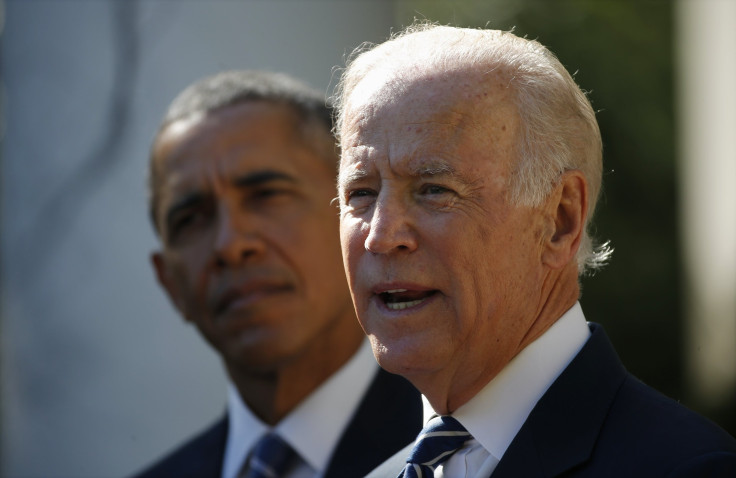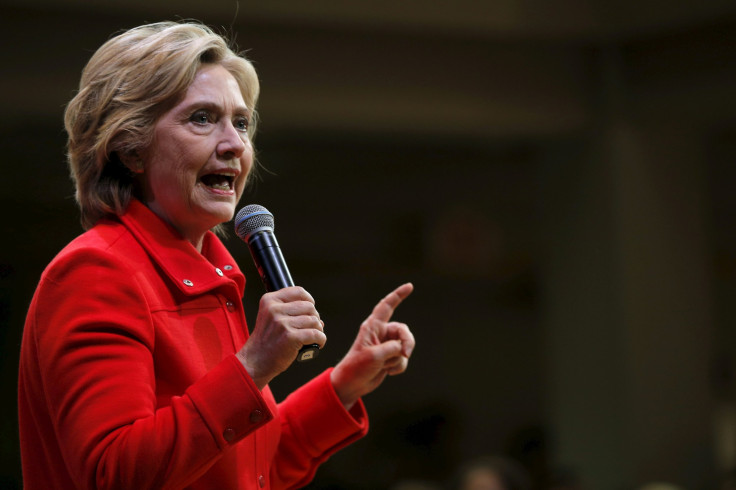Why Isn't Joe Biden Running For President? How Hillary Clinton May Have Scared Off Vice President

After months of agonizing, closed-door discussions and teasing the media, Vice President Joe Biden announced Wednesday that he will not run for president. He hinted in his announcement that he no longer had enough time to raise sufficient funds to compete against the Democratic front-runner, former U.S. Secretary of State Hillary Clinton, who has amassed a massive war chest aimed at taking out any rivals for the Democratic nomination and the eventual Republican nominee in a general election.
"Unfortunately, I believe we're out of time, time to mount a winning campaign," Biden said in a White House appearance Wednesday, where he was accompanied by President Barack Obama and his wife. In his speech Biden discussed his recently deceased son Beau and the need for politicians to work together to get the country to function.
There had been back-and-forth among those who knew Biden in recent days. After NBC News reported Monday morning that a decision would come in the next 48 hours, U.S. Rep. Brendan Boyle, D-Pa., tweeted that a “very good source” told him the veep would run.
I have a very good source close to Joe that tells me VP Biden will run for Prez
— US Rep Brendan Boyle (@RepBrendanBoyle) October 19, 2015But others weren’t so sure. A reporter for the News Journal in Delaware tweeted Monday that the state's AFL-CIO President Samuel Lathem doubted the early speculation.
Delaware labor leader Sam Lathem on Biden 2016 talk: "You can speculate. You can guess. But believe me, nobody knows but Joe"
— Jonathan Starkey (@jwstarkey) October 19, 2015Biden has been noncommittal for most of this year, saying there were many factors he needed to weigh before deciding whether to jump into the 2016 race. One of his most important considerations has been if this is the right time for his family to be under the spotlight that a presidential bid would require.
“Everybody talks about a lot of other factors: the other people in the race; whether I can raise the money; whether I can put together an organization,” Biden said at a Sept. 3 event in Atlanta. “That’s not the factor. The factor is, Can I do it? Can my family undertake what would be an arduous process that we would in other circumstances?”
The death of his son Beau in May shook the vice president, and it has been reported that from his deathbed Beau urged his father to run. Even with the focus on his family, the 72-year-old vice president has no doubt been scrutinizing his place in the polls and how a 2016 bid would play out. Despite not being officially in the race, he held a polling average of 16.8 percent, according to Real Clear Politics, which placed him third behind Clinton and Vermont Sen. Bernie Sanders. But other polls have shown mixed enthusiasm for a Biden candidacy. A Reuters/Ipsos poll published Oct. 12 found that while 48 percent of Democrats surveyed wanted Biden to enter the race, just 17 percent said he would be their first choice.
In the wake of the first Democratic presidential debate earlier this month, many strategists and members of the media suggested that Clinton’s surprisingly strong performance could be a sign that Biden may be too late to enter the race. He was once considered a safety net option for Clinton, whose campaign has been dogged by controversy over a private email server she kept while secretary of state. But this week marked another big deadline for Biden on that front -- Thursday is Clinton’s hearing in front of the House panel investigating the 2012 attacks on U.S. diplomats in Benghazi, Libya. The Monday warning of 48 hours was seen as a smart move, because supporters were worried that if Biden waited to see how Thursday’s hearing affected Clinton, his motivations would be viewed as too opportunistic.

A Biden candidacy could have faced a number of policy related issues and would have needed to figure out quickly how to navigate the space between Clinton and the Obama administration. His entry would have been big news, but how he handled the competition would have determined if his candidacy was merely awkward for Clinton or would have made a lasting impact. Biden’s first shot at the presidency in 1988 ended early due to gaffes, and his 2008 run against Clinton and President Barack Obama saw him struggle because of a lack of voter recognition and from an emphasis on experience in Washington, which failed to seem exciting in comparison to Obama’s message of change.
This time around, there would have been no way for Biden to distance himself from the White House or its policies. For her part, Clinton could have used Biden’s entry as a way to further separate herself from Obama and scoop up more liberal voters. She has already taken some liberal positions this cycle, such as on her criticism of the Trans-Pacific Partnership, the international trade deal she originally supported, her opposition to arctic drilling and her strong rhetoric regarding Wall Street reform. It’s historically been difficult for any party to keep the White House for three election cycles, and even rarer for vice presidents to be elected as president immediately following their time in the No. 2 spot.
Biden served in the U.S. Senate from 1973 until he became vice president in 2009. While in the Senate he was chair of both the Foreign Relations Committee and the Judiciary Committee for long periods. He is known as a progressive in some areas, particularly on LGBT rights, where he was seen to push Obama toward publicly accepting marriage equality. He holds an “F” rating from the NRA for his gun control record and supports reinstating a ban on assault weapons.
When he was in the Senate, Biden co-sponsored a 1984 law that created incentives for police to seize an individual’s assets if they were suspected of drug trafficking involvement. Since then, the legislation has become controversial as opponents say police use civil asset forfeiture against people who have not committed any crimes. He also supported the 1994 Violent Crime Control and Law Enforcement Act, which led to harsher sentencing and an increasing prison population, as well as other laws that have been criticized for how they affected drug-related incarceration rates. Clinton also has ties to controversial drug policies. As first lady, she championed the 1994 law and similar ideas that she spent time discussing with representatives of the Black Lives Matter movement this year. Biden would have likely needed to address his record on civil rights and social justice to have had a chance with the crucial minority voter blocs who heavily favor Clinton so far.
With the next Democratic presidential debate coming up Nov. 14, many Democratic strategists had been hoping they will have a settled field before then. And now that Biden has made his decision, the looming Benghazi hearing Thursday approaches as the first hurdle for Clinton with Biden potentially ready to comment in the wings.
© Copyright IBTimes 2024. All rights reserved.






















